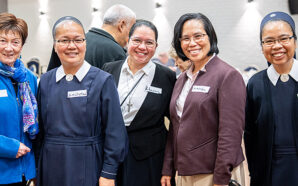Homily for the 22nd Sunday in Ordinary Time and Social Justice Sunday
Readings: Sirach 3:17-20, 28-29; Psalm 67(68):4-7, 10-11; Hebrews 12:18-19, 22-24; Luke 14:1, 7-14
28 August 2022
Today is Social Justice Sunday. Our bishops have issued a statement entitled ‘Respect: Confronting Violence and Abuse’. I read the statement while flying to Cairns for the national conference of Catholic Social Services Australia. I was pleased that the statement stressed the gendered nature of much domestic violence and abuse. Introducing the statement, Archbishop Tim Costelloe SDB, President of the Australian Catholic Bishops Conference, writes: “In recent years we have witnessed a new wave of campaigns to confront violence and abuse. We have heard new calls for respect in relationships. Many have spoken out to highlight the extent of abuse throughout society – in the home, in the workplace, and in various groups in the community, including the Church. Those who suffer such abuse are most frequently women and children while the perpetrators are most frequently men.”
LISTEN: https://soundcloud.com/frank-brennan-6/homily-28822
The statement notes: ‘Inequality between women and men is central to the drivers and enablers of family and domestic violence.’[1] There are statistics from all manner of reports quoted to back up the claim that most abuse is suffered by women at the hands of men.
For me, the most confronting insight in the statement was that ‘abused Christian women are more likely to remain in or return to unsafe relationships, citing religious beliefs to support such decisions. Christian women who suffer domestic violence display a tendency to use Christian symbolism and religious language to explain or tolerate abuse, and to remain in or return to marriages that contain domestic violence.’
These women cite ‘the undesirability of divorce, the need to love and honour husbands, and the power of forgiveness and prayer to generate change in the abuser.’ How then might we harness religious beliefs, Christian symbolism and religious language to counter the threat and reality of abuse?
The statement concludes with this observation: ‘The roots of violence lie in the abuse of power to control and dominate others. This stands in stark contrast to the relationships to which God calls us – relationships marked by equality and reciprocity rather than domination and violence, respect and freedom rather than coercion and control.’
In today’s gospel, Jesus attends a fine dinner with a leading Pharisee. He tells his host: “When you hold a lunch or a dinner, do not invite your friends or your brothers or your relatives or your wealthy neighbours, in case they may invite you back and you have repayment. Rather, when you hold a banquet, invite the poor, the crippled, the lame, the blind; blessed indeed will you be because of their inability to repay you. For you will be repaid at the resurrection of the righteous.”
Jesus teaches us how to extend equality and reciprocity, respect and freedom to those who would least expect these things. Why do such people have no expectation of equality and respect in future? Quite simply that because of their social situation, they have never to date experienced equality, reciprocity, respect and freedom.
Having arrived in Cairns, I took a cab to the conference centre. The cabbie was a talkative North Queenslander. He asked what I was up to, what was my occupation, and what would I be speaking about at the conference. Having given the briefest introduction to the topic of domestic violence, as one topic to be addressed, I had little opportunity to say another word before arrival at the conference centre. The cabbie asked many rhetorical questions without waiting for any answers. He wondered why people like me always talk about violence suffered by women perpetrated by men. He wondered why no one ever spoke publicly about men who suffer violence at the hands of women. He assured me that he had never assaulted a woman but that he had suffered abuse from women on many occasions. He asked, “Why do people say, ‘Good wife, happy life’, rather than ‘Good spouse, happy house’?” I must confess that I didn’t know where to start. I had no immediate answers. I had no way of establishing an immediate relationship of equality and reciprocity, respect and freedom. I paid my fare and was happy to get out of the cab.
On arrival in Cairns, I heard the ghastly news of the death of a five-year-old child at Yarrabah, the large Aboriginal community one hour’s drive from Cairns. The boy died on Monday after a week in hospital following upon appalling injuries allegedly inflicted by his 24-year-old father.
Next day, I travelled to Yarrabah to attend the funeral of Aboriginal Anglican Bishop Arthur Malcolm. St Albans Anglican Church was full to overflowing with hundreds of us standing outdoors watching the proceedings on screen. The whole community had gathered in solemn grief and proud acknowledgment of one of their own who had been a humble, gentle leader to his own community and to many groups far and away from Yarrabah. I had last joined Arthur and the community in St Albans Church for the handover of the Yarrabah land title in 1986. A month later, we were in Alice Springs for the meeting of Pope John Paul II with Aborigines and Torres Strait Islanders. We were then together at the opening of the World Council of Churches Assembly in Canberra in 1991 when he wore my ordination vestment. After that, I and three other Catholic priests were privileged to attend the first ordination of Aboriginal Anglican priests on Palm Island by him as their Aboriginal Anglican Bishop. There were many testimonies to Arthur’s passionate commitment to reconciliation and the need for his people to have a voice in shaping their destiny.[2]
The Yarrabah community had turned out in vast numbers to honour their bishop. There were many Anglican bishops in attendance, including Philip Freier, the Primate who travelled from Melbourne. Philip had first met Arthur when Philip and his wife Joy came to Yarrabah as teachers in the state school. Arthur’s son gave a brief address thanking everyone for their attendance. The main addresses including the sermon and eulogy were delivered by three white bishops.
Meanwhile, the 24-year-old father of the dead boy appeared in court that same morning, being charged not just with murder but also with torture. The lead police investigator said police would allege the boy had been subject to a series of assaults “over a protracted period”. He said, “The injuries that cost the young boy his life… were catastrophic injuries. They were confronting to the investigators that are dealing with this matter and confronting for the family to have to deal with.”
At the funeral, we all prayed for peace, justice and reconciliation. I was there as a visitor to a community wracked with grief and trauma. No doubt, we all need to confront violence and abuse with respect. My conversation with the Cairns cabbie and the stark contrast of the solemn dignified funeral at Yarrabah while the community came to terms with the horrific death of one of their children have left me wondering how do we even start to invite the poor, the crippled, the lame, and the blind to our banquet table. Let us pray the prayer composed for this year’s Social Justice Sunday:[3]
Loving God, you made each of us in your image and likeness.
Open our eyes to recognise one another as equals,
replacing domination and control, violence, and abuse,
with mutuality, reciprocity, respect, and freedom.
Help us to love like you.
Jesus Christ, you rejected the use of religious traditions to justify violence.
Teach us to unmask manipulations of our faith used to justify violent, abusive, or coercive behaviour.
Teach us to be people who show tenderness, respect and care for others as you did.
Holy Spirit, you are with us always, showing us the way.
Move us to assist those who experience violence and abuse, and support their call for justice.
Empower us to hold perpetrators of violence and abuse responsible, encouraging them to change their behaviour.
We make this our prayer, through Christ Our Lord. Amen.
Fr Frank Brennan SJ is the Rector of Newman College, Melbourne, and the former CEO of Catholic Social Services Australia (CSSA). He has been appointed a peritus at the Fifth Plenary Council of the Australian Catholic Church.
[1] The social justice statement is available at https://drive.google.com/file/d/1ywUe8vTK1m4wMKNG9cEdCTDcfEgSwuTN/view
[2] The funeral can be viewed at https://livestream.com/rapidspin/bishopmalcolm
[3] Available at https://drive.google.com/file/d/1i8e3sfO4SwOPJhogTZNS8pSe43bwqguE/view








